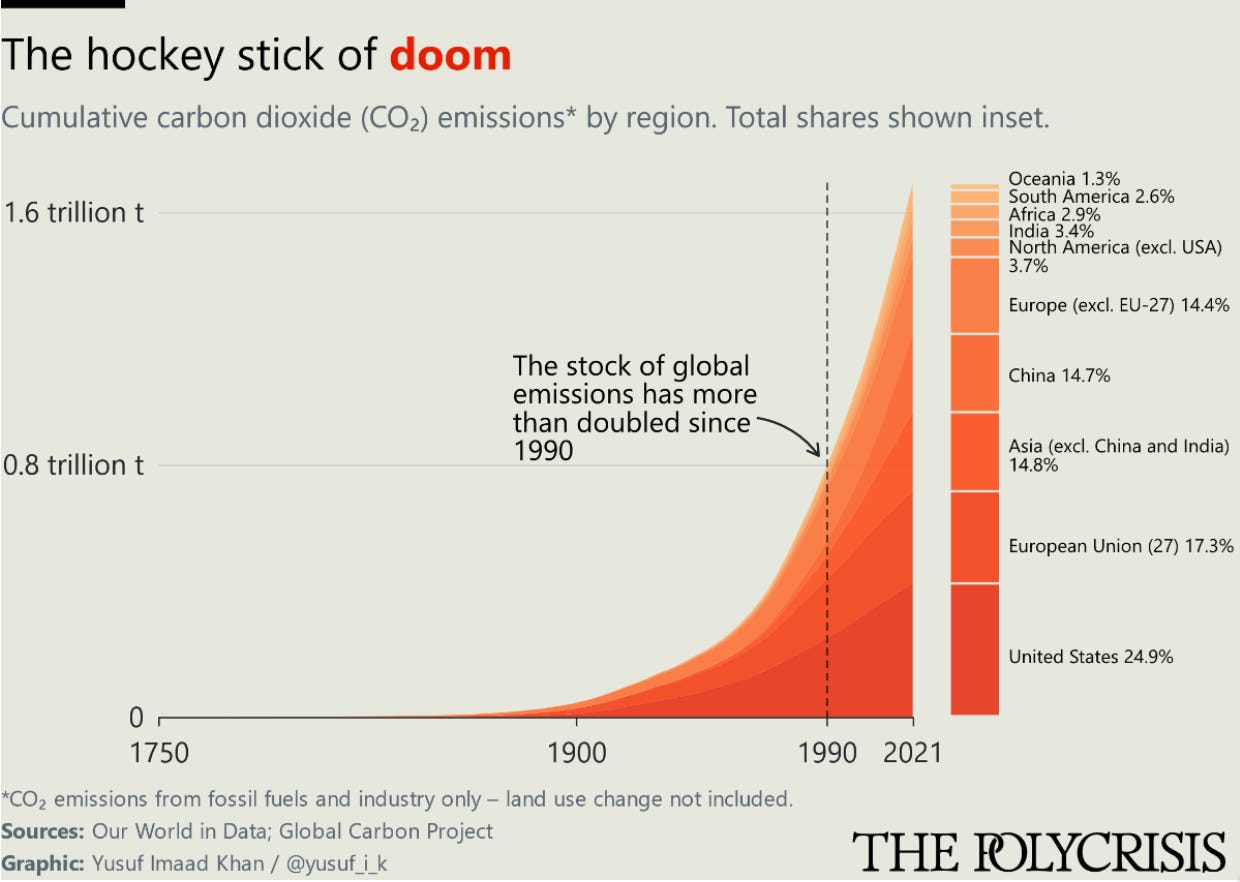BRIEFLY NOTED: For 2023-08-21 Mo
MUST-READ: China’s Borrowing þe Entrepreneurial Class of Hong Kong (& Taiwan!) as a Key to Its Development Success:
One of those things that I thought was so obvious everyone knew it. But apparently it is not so:
Yasheng Huang: How to Kill Chinese Dynamism: ‘Those who believe that Chinese entrepreneurship and growth have thrived under a magical formula of statism ignore the role that Hong Kong played in providing the conventional pillars of market finance and the rule of law. Without this escape valve, China’s great economic success story never would have happened…. Though mainland China does not have rule of law and market finance, it effectively outsourced those functions to Hong Kong after Deng Xiaoping succeeded Mao Zedong and launched China’s reform era…. In late 2018, there are nine Chinese firms among the world’s 20 biggest tech companies, and only three of them are fully domiciled domestically: Tencent, Xiaomi, and Ant Group (whose parent firm is foreign-registered)…. Hong Kong has been dragged away from the rule of law… at a time of geopolitical tensions, deglobalization, and increasing economic insularity. New safe harbors have emerged, such as Singapore, but this time they are hosting economic refugees from China rather than performing the institutional functions that previously powered China’s high-tech entrepreneurship. Soon, China will feel the effects of no longer being able to outsource the rule of law and the other basic ingredients of innovation-driven growth, and it will pay a steep price for getting basic economics so egregiously wrong…
TWO IMAGES: Human-Driven Carbon Dioxide Cumulative Emissions in Historical Perspective, Western North America Wildfires:
MANY VIDEOS: Taylor Swift Eras Tour:
<https://www.youtube.com/results?search_query=taylor+swift+eras+tour>
Very Briefly Noted:
Economics: Philipp Heimberger: ‘Do higher public debt levels reduce economic growth? My meta-analysis is out in the September issue of Journal of Economic Surveys. By analysing 816 estimates, I find - publication bias in favour of negative growth effects - no uniform public-debt-to-GDP threshold…
Industrial Policy: Noah Smith: Mike Bird and Noah Smith debate industrial policy: ‘Mike thinks the sheer number of different justifications given for industrial policy… is a negative… Gish Gallop). To me, though, having a bunch of reasons to do industrial policy is a feature…
China: Andrew Sheng & Xiao Geng: China’s Stunted Transformation: ‘Major road blocks as it has attempted to implement its “dual circulation” growth strategy…. By striking deals before construction was completed, developers and home-buyers left themselves exposed to interest-rate increases and slowdowns in price growth…. The real-estate sector’s travails have generated considerable fiscal challenges…. The deterioration of US-China relations, and the disruptions caused by the COVID-19 pandemic, have further impeded China’s structural transformation…
Global Warming: Lex: Climate change: the chilling reality of baking cities: ‘The heat is on for urban areas as the threat grows that some may become unliveable in the not too distant future…
Public Sphere: Daniel W. Drezner: The End of Centrism?: ‘Some scattered thoughts on the meaning of centrism nowadays…. To the left, centrism is just crypto-fascism in sheep’s clothing. And hey, Hanania certainly gives them a data point to advance that argument!… I’m not calling myself a centrist anymore. That term has way too much baggage in 2023…
Journamalism: Corinne Low: ‘Blind Side author Michal Lewis says, “[Michael Oher] is on the Dean’s list at Ole Miss, which tells you a lot about the Dean’s list at Ole Miss,” to laughter from his primarily white audience. God what an absolutely awful thing to say: Nancy French: “Michael Oher disliked being portrayed as “dumb” in the “Blindside” film. Where did that stigma originate. Listen to the author of the Blindside book—Michael Lewis…
Treason: Ken White: Overt Acts and Predicate Acts, Explained: ‘No, Fani Willis Is Not Making Tweets Or Phone Calls Into Crimes. But Maybe Her Indictment Is A Bit Indulgent And Gratuitous…
¶s:
Economics: The degree to which language and the market are allowing us to function as a collective anthology intelligence whose total effective brainpower is massively beyond what any individual human could possibly know is truly astounding:
Ricardo Hausmann, Tracy Alloway, Joe Weisenthal, & Isabel Webb Carey: Why Economic Complexity Is So Important: ‘Knowledge at the societal level has been exploding exponentially. But our mental capacity to know has not…. The way in which a society grows is it grows its knowledge by putting different bits of knowledge in different heads and then by bringing those heads together…. If you are going to do stuff that requires a lot of knowledge, you’ll have to… network these brains together… complexity emerges as the consequence of distributed knowledge in society…. What is really driving growth is this growth of knowledge and the growth of using that knowledge.. bring[ing] those heads together to make relatively long chains of brains…
The only reason to believe that there will be a recession in the next year is the inversion of the yield curve. Long-term rates’ implicit forecasts future short rates make sense only if the Federal Reserve starts cutting interest rates relatively soon. The only thing that would lead them to do so is a recession. But does yield curve inversion right now represent rational forecasts of bond traders? Or is it the result of the fact that the bond market now has a huge number of people in it who have, throughout their careers, always won by betting that bond prices will go up?:
Economist: Beyond the tech hype, how healthy is American business?: Most parts of the non-AI economy are doing surprisingly well‘Capital-goods manufacturers, such as Caterpillar and Raytheon… are reckoned to have collectively increased their revenues by more than 8% in the second quarter, and their profits by twice as much—perhaps thanks in part to President Joe Biden’s taste for industrial policy. Even the oil-and-gas giants are doing better than the headline numbers suggest…. Resilience is perhaps most obvious for businesses with fortunes tied to the condition of the American consumer, who remains in rude health. Pedlars of staples, such as foodstuffs and household goods, saw their profits rise by 5% year on year, according to UBS. For purveyors of non-staple consumer goods, earnings shot up by 40%. On August 1st Starbucks, a coffee-shop colossus (ranked 116th in our ai index), reported a quarterly operating profit of $1.6bn, up by 22%. The next day Kraft Heinz, a seller of ketchup and baked beans (ranked 253rd), said it made $1.4bn in operating profit, two and a half times what it did a year ago. Consumer-goods firms have held on to pricing power…
Vampires: So how deep did vampire lore go in popular consciousness in the years before 1900? And where did it come from? And, I mean, TB was not a strange or unusual thing:
Christopher Klein: The Last American Vampire: ‘The grisly vampire hysteria that gripped a New England town in 1892 sounds like a Halloween legend, but it is a true tale of the macabre…. Exeter, Rhode Island… 1892…. The townspeople then turned their attention to the casket of Mercy Brown, who had died eight weeks earlier. Accounts differ as to whether Mercy’s body had already been buried or if it rested in a crypt until the ground could thaw and undertakers could dig a grave. However, when the lid was lifted off of Mercy’s coffin, her body was found on her side. Her face appeared flush, and there was blood in her heart and in her veins. Dr. Harold Metcalf, who had raised his objection to the entire affair, assured everyone that the lack of decomposition of Mercy’s body [in winter] was perfectly consistent with the fact that she had been dead for less than two months. Knowing that medicine had done nothing to save the Browns, the people of Exeter ignored the doctor’s proclamations and took the presence of fresh blood in Mercy’s heart as a sign that she was undead. They gathered firewood and kindled a bonfire on a pile of nearby rocks. Then they cut out Mercy’s heart and lungs and cremated them on the pyre. They returned to Edwin Brown’s house with the ashes of his dead sister’s heart and mixed them with water. Edwin consumed the concoction, but the tuberculosis continued to consume him. He died two months later on May 2, 1892…



